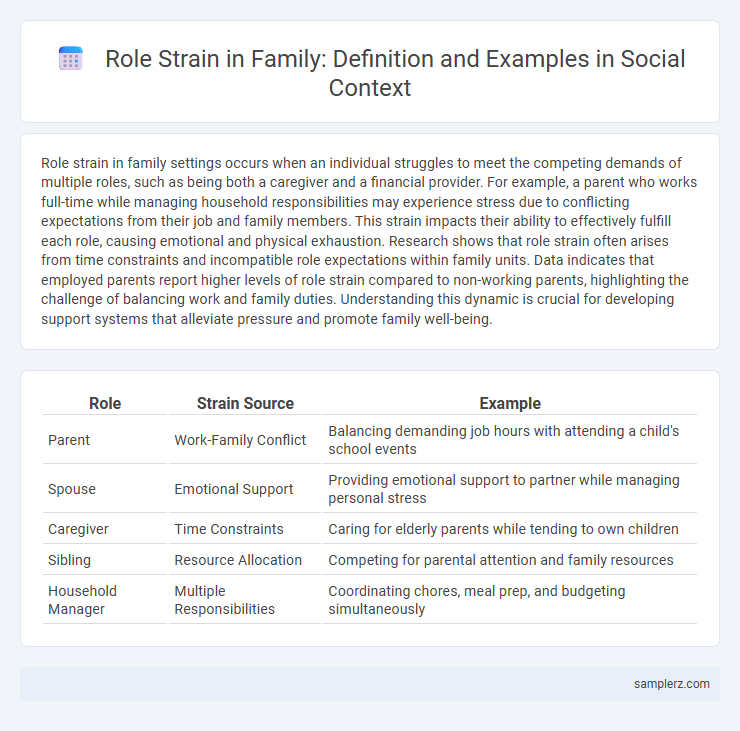Role strain in family settings occurs when an individual struggles to meet the competing demands of multiple roles, such as being both a caregiver and a financial provider. For example, a parent who works full-time while managing household responsibilities may experience stress due to conflicting expectations from their job and family members. This strain impacts their ability to effectively fulfill each role, causing emotional and physical exhaustion. Research shows that role strain often arises from time constraints and incompatible role expectations within family units. Data indicates that employed parents report higher levels of role strain compared to non-working parents, highlighting the challenge of balancing work and family duties. Understanding this dynamic is crucial for developing support systems that alleviate pressure and promote family well-being.
Table of Comparison
| Role | Strain Source | Example |
|---|---|---|
| Parent | Work-Family Conflict | Balancing demanding job hours with attending a child's school events |
| Spouse | Emotional Support | Providing emotional support to partner while managing personal stress |
| Caregiver | Time Constraints | Caring for elderly parents while tending to own children |
| Sibling | Resource Allocation | Competing for parental attention and family resources |
| Household Manager | Multiple Responsibilities | Coordinating chores, meal prep, and budgeting simultaneously |
Understanding Role Strain Within Family Dynamics
Role strain in family dynamics often emerges when individuals face conflicting expectations, such as parents balancing work demands with caregiving responsibilities, leading to stress and decreased well-being. Caregivers may experience role overload by managing children's education, household tasks, and eldercare simultaneously, affecting mental health and family cohesion. Recognizing these pressures highlights the importance of supportive communication and shared responsibilities to reduce stress and improve family functioning.
Parental Role Strain: Juggling Work and Childcare
Parental role strain arises when parents struggle to balance demanding work schedules with childcare responsibilities, leading to stress and decreased well-being. Studies show that parents working over 50 hours a week experience higher levels of anxiety due to limited time for quality interaction with children. This tension often results in reduced parenting effectiveness and increased conflict within the family unit.
Sibling Responsibilities: Navigating Expectations and Pressure
Sibling responsibilities often create role strain as individuals balance caregiving, academic support, and emotional guidance within the family. Expectations to act as mediators or parental substitutes increase pressure, impacting mental health and personal development. Navigating these demands requires effective communication and clear boundaries to reduce stress and maintain family harmony.
Role Strain in Sandwich Generation Caregivers
Sandwich generation caregivers experience role strain by simultaneously managing childcare, eldercare, and professional responsibilities, leading to increased stress and time constraints. This role strain often results in psychological distress, decreased job performance, and strained family relationships due to conflicting demands. Studies show that 47% of adults aged 40-59 provide care to aging parents while supporting their own children, highlighting the widespread impact of role strain in this demographic.
Dual-Income Households and Division of Labor
Dual-income households often face role strain due to the unequal division of labor in domestic responsibilities, where one partner may disproportionately handle childcare and housework despite both contributing financially. This imbalance can lead to stress and conflict as partners struggle to meet both work and family demands effectively. Research shows that role strain intensifies when traditional gender roles persist, limiting cooperation and increasing emotional exhaustion within the family unit.
Stepparenting and Complex Family Roles
Stepparenting often involves navigating role strain as individuals balance disciplinary responsibilities while fostering emotional bonds with stepchildren. Complex family roles arise when stepparents juggle expectations from biological parents, children, and their own identity, leading to conflicting duties and stress. These dynamics highlight the challenges in establishing authority and maintaining harmony within blended family structures.
Grandparent Caregivers: Balancing Old and New Roles
Grandparent caregivers experience role strain as they balance the traditional role of elders with new responsibilities of primary caregivers, often feeling pressure to provide emotional support and financial stability simultaneously. This dual role can lead to stress due to conflicting expectations from their adult children and grandchildren. Research shows that nearly 2.7 million grandparents in the U.S. are responsible for their grandchildren, highlighting the widespread nature of this social challenge.
Traditional vs. Modern Family Roles: Sources of Strain
Role strain in families often arises from conflicts between traditional and modern family roles, where expectations for caregiving, breadwinning, and household responsibilities clash. For example, in traditional families, women may be expected to prioritize childcare and domestic duties, while modern roles encourage dual-income households with shared domestic tasks. This divergence creates stress as individuals struggle to meet conflicting demands, impacting family cohesion and individual well-being.
Impact of Role Strain on Family Relationships
Role strain in family dynamics often emerges when parents juggle multiple responsibilities, leading to increased stress and communication breakdowns. This tension can deteriorate trust and emotional connections among family members, contributing to conflicts and decreased overall family cohesion. Chronic role strain may exacerbate feelings of isolation and reduce the quality of support within the household, negatively impacting mental health and relationship satisfaction.
Coping Strategies for Managing Family Role Strain
Family role strain often arises when individuals juggle competing demands such as parenting, work responsibilities, and caregiving for elderly relatives, leading to stress and conflict. Effective coping strategies include time management techniques, seeking social support from extended family or community resources, and practicing self-care activities like mindfulness and exercise to reduce emotional exhaustion. Implementing clear family communication and setting realistic expectations can also alleviate the pressures associated with overlapping family roles.

example of role strain in family Infographic
 samplerz.com
samplerz.com